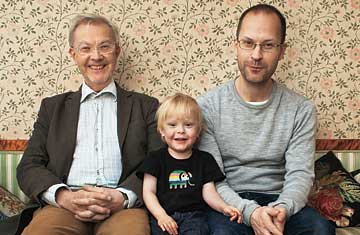
Three generations: Dr. Lars Olov Bygren, with son Magnus and grandson Ludvig in Stockholm
(4 of 8)
The B vitamins acted as methyl donors: they caused methyl groups to attach more frequently to the agouti gene in utero, thereby altering its expression. And so without altering the genomic structure of mouse DNA--simply by furnishing B vitamins--Jirtle and Waterland got agouti mothers to produce healthy brown pups that were of normal weight and not prone to diabetes.
Other recent studies have also shown the power of environment over gene expression. For instance, fruit flies exposed to a drug called geldanamycin show unusual outgrowths on their eyes that can last through at least 13 generations of offspring even though no change in DNA has occurred (and generations 2 through 13 were not directly exposed to the drug). Similarly, according to a paper published last year in the Quarterly Review of Biology by Eva Jablonka (an epigenetic pioneer) and Gal Raz of Tel Aviv University, roundworms fed with a kind of bacteria can feature a small, dumpy appearance and a switched-off green fluorescent protein; the changes last at least 40 generations. (Jablonka and Raz's paper catalogs some 100 forms of epigenetic inheritance.)
Can epigenetic changes be permanent? Possibly, but it's important to remember that epigenetics isn't evolution. It doesn't change DNA. Epigenetic changes represent a biological response to an environmental stressor. That response can be inherited through many generations via epigenetic marks, but if you remove the environmental pressure, the epigenetic marks will eventually fade, and the DNA code will--over time--begin to revert to its original programming. That's the current thinking, anyway: that only natural selection causes permanent genetic change.
And yet even if epigenetic inheritance doesn't last forever, it can be hugely powerful. In February 2009, the Journal of Neuroscience published a paper showing that even memory--a wildly complex biological and psychological process--can be improved from one generation to the next via epigenetics. The paper described an experiment with mice led by Larry Feig, a Tufts University biochemist. Feig's team exposed mice with genetic memory problems to an environment rich with toys, exercise and extra attention. These mice showed significant improvement in long-term potentiation (LTP), a form of neural transmission that is key to memory formation. Surprisingly, their offspring also showed LTP improvement, even when the offspring got no extra attention.
All this explains why the scientific community is so nervously excited about epigenetics. In his forthcoming book The Genius in All of Us: Why Everything You've Been Told About Genetics, Talent and IQ Is Wrong, science writer David Shenk says epigenetics is helping usher in a "new paradigm" that "reveals how bankrupt the phrase 'nature versus nurture' really is." He calls epigenetics "perhaps the most important discovery in the science of heredity since the gene."
